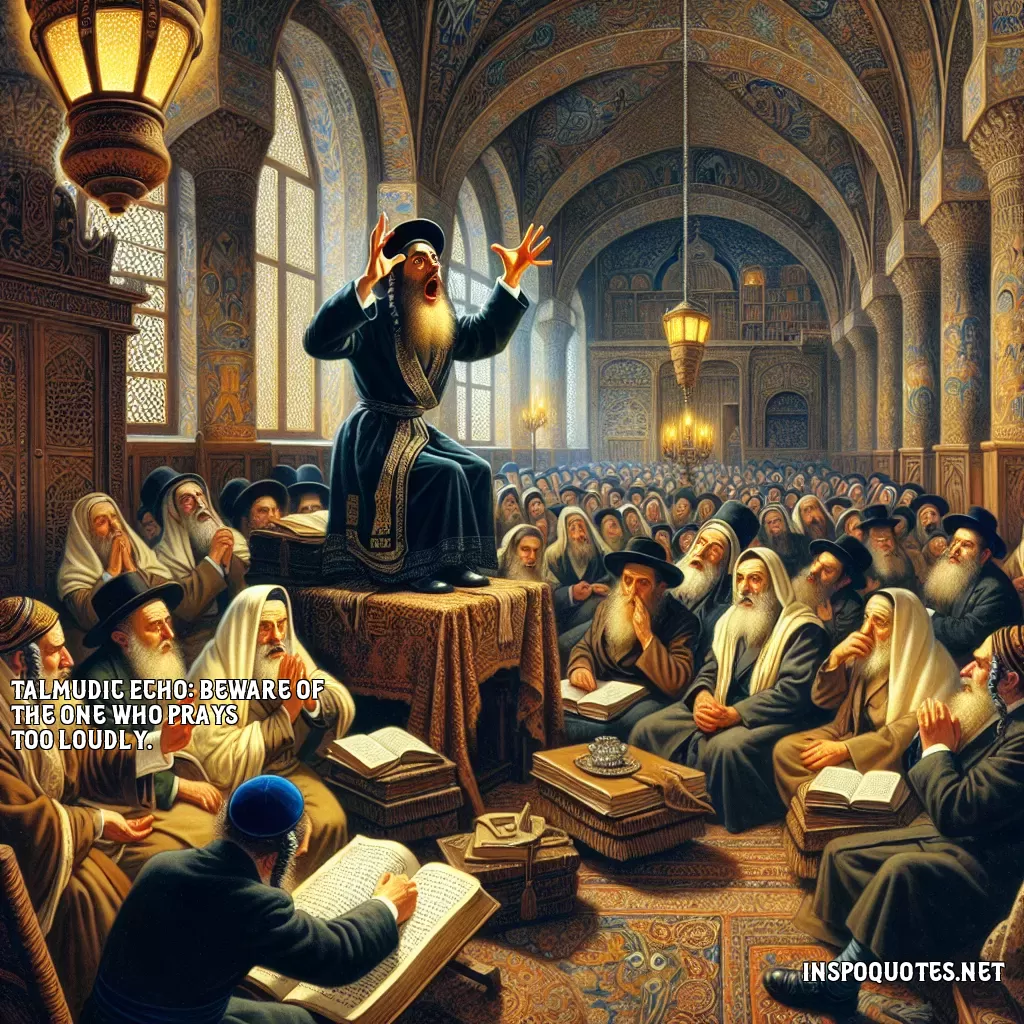
Talmudic Echo: Beware of the one who prays too loudly.
Author: Abraham Joshua Heschel
👁️ 9 views
The quote “Talmudic Echo: Beware of the one who prays too loudly” draws attention to the caution one should have with the ostentatious display of piety. The reference to the Talmud, a central text in Jewish religious tradition, suggests a connection to teachings emphasizing genuine spirituality and humility over performative gestures. Praying loudly, in this context, symbolizes those who may engage more in the act of being seen as devout rather than nurturing an authentic spiritual connection. These individuals might seek external validation or social approval for their religious acts rather than focusing on personal growth and sincere devotion. The loud prayer becomes a metaphor for any overt demonstration of virtue designed to attract attention. This quote warns against trusting appearances without questioning true intentions. It implies that true spirituality is an internal journey, not one that is validated by external acknowledgment. By cautioning against "the one who prays too loudly," it suggests that genuine virtues are often quiet and humble, fostered within rather than displayed for others. Furthermore, this expression may caution communities against equating visible religious zeal with genuine moral character. Loud prayer is not necessarily an indicator of a person's sincerity or integrity. The caution lies in not mistaking appearance for substance or allowing oneself to be misled by superficial markers of faithfulness. Overall, this quote serves as a reminder to value sincerity and inner spirituality over external displays, urging a deeper discernment of character and intent beyond superficial shows of devotion.
Quote By: Abraham Joshua Heschel
Abraham Joshua Heschel was a prominent Jewish theologian and philosopher who left an indelible mark on the fields of religious thought, social justice, and spirituality in the 20th century. Born on January 11, 1907, in Warsaw, Poland, Heschel came from a family of esteemed rabbis, which greatly influenced his early education and his deep commitment to Jewish thought. He studied at the University of Berlin, where he was exposed to the philosophical ideas of his time, assimilating influences from both Jewish and secular thinkers.
Heschel emigrated to the United States in 1939 to escape the growing threat of Nazism in Europe. Settling in New York, he soon became a professor of Jewish philosophy at the Jewish Theological Seminary, where he taught for much of his career. His contributions to Jewish thought are profound, particularly through his seminal works such as "God in Search of Man" and "The Sabbath." In these texts, Heschel articulates a unique vision of spirituality that emphasizes the importance of a transcendent God and the need for a deep, personal connection with the divine.
Beyond his theological insights, Abraham Joshua Heschel was an outspoken advocate for social justice. He was deeply involved in the Civil Rights Movement, marching alongside figures like Martin Luther King Jr. His book "The Prophets" illustrates how biblical prophets served as voices for social change, emphasizing the moral imperative to confront injustice and uphold human dignity. Heschel’s belief that “words create worlds” reflects his understanding of the power of language in shaping reality and social consciousness.
Heschel's legacy continues to resonate today, as his thoughts on spirituality, morality, and the human experience remain relevant in contemporary discussions about faith and justice. He passed away on December 23, 1972, but his writings and teachings endure, inspiring new generations to explore the profound connections between faith, activism, and the search for meaning. Abraham Joshua Heschel's life was a testament to the idea that spirituality and social responsibility can and should coexist in a harmonious pursuit of a just world.